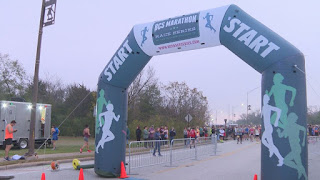Note: I've been doing extensive research on races in 2021 for my clients; if you need any insight or planning for your 2021 season, let me know through my contacts here and on www.gofarthersports.com
This is going to be an interesting article.
After a lot of the races being cancelled in 2020, it would be quite hard to plan races for 2021.
Ah, but there is a way! You just have to do your homework.
You'll need to find a race that will have high odds of happening, and even if they are cancelled, have some recourse (refunds and cancellation). So the big factors to consider are race size, location, format, and cancellation policy.
Race Size
Races come in a lot of shapes and sizes, from the 60,000 person New York City marathon, to your hometown informal Fat Ass race with 100 people. With the recent problems that we face, it seems like larger races will much less likely happen than smaller races. Obviously, most of the local governments are trying to limit group gatherings. Another advantage that smaller races have over larger races is that they are more discreet. They don't "stick out" much and will not invite opposition for local governments to shut down the races.
Advantage: Small races
Location
This is by no means political, so try not to take it as such. It's more an observation than an opinion.
Blue states readily tend to enact more restrictions than red states. Recently, New Jersey just limited its gatherings to 25 people or less (will be in force tomorrow, December 7). Other blue states have similar restrictions in place as well as restrictions in traveling into these states (some have quarantine orders). Some red states do have restrictions, but these are much less frequent than others.
If you're looking at red states, remember that the cities and towns in these states might have local restrictions, so even though the state is not imposing the restrictions, the towns might.
Advantage: Red states away from the cities and towns there.
Format
This is a broad category. I'll try to sort them all out here.
One format is the triathlon. This will be difficult to get off as the swim can be a big problem. Swimming is the most dangerous element in triathlon and often the park rangers or the cities supplying the permits need to have certified lifeguards there to monitor the swim portion. As governments can easily take away the permits, triathlon would be tough to do without that support. Of course it can still happen, but the RD will have to assume the risk in case someone drowns. And RDs will not take that risk most of the time. What the RDs might do is to substitute swimming with a different sport, like rollerblading or orienteering. Sometimes they'll just tack on an extra run in the beginning (run-bike-run format). Those will more likely happen than a traditional triathlon.
Road running can happen, and if the race is small enough, can be done without permits from the city or park if done discreetly (Fat Ass). Most of the races will happen in an urban park and will most likely have loops, logistics, of course. If it is a Fat Ass, it would more likely go off than not.
Trail running is perhaps the best opportunity that can happen. Most of the trails happen in larger parks away from the city, so the rangers will more likely issue permits than not. Sometimes these are Fat Ass races too, but the course is kept small and in loops to ensure they stay low-profile.
Advantage: Organized trail running or Fat Ass races.
Cancellation Policy
This one mitigates your loses in case a race has to cancel. When looking for a race you'll need to see what its cancellation policy, specially for Covid. Race directors, in their lure to attract doubtful runners, have fully relaxed their cancellation policies and have promised either to defer the registration to another of their races without charge or to provide 100% of the refund. And some trail races have started doing "nothing down" registration. They can register for a race and provide their credit card info, but the race director will not charge your card until a week or two before the race when they receive confirmation that they're on! I think UltraSignUp has that option. Look for other races to follow suit.
As for Fat Ass races, they're basically free (you really "donate" the day of the race), so you don't have to worry about them at all.
Advantage: Races with 100% cancellation, nothing down registration, or Fat Ass races
One little mention is travel. Travel seems to be very dicey nowadays. International travel is a clusterf--k. You have to worry about quarantine and all sorts of testing just to make it across the border...that is if the borders are open! Know your destination country inside and out before even considering a race there. Domestic travel? Some states do have quarantine orders in place too but they are less onerous than crossing international borders. Anything within driving distance is certainly better than air travel as flights can be cancelled.
That's it in a nutshell. If you have any questions, let me know, either in the comments below or though my contacts at www.gofarthersports.com .





No comments:
Post a Comment